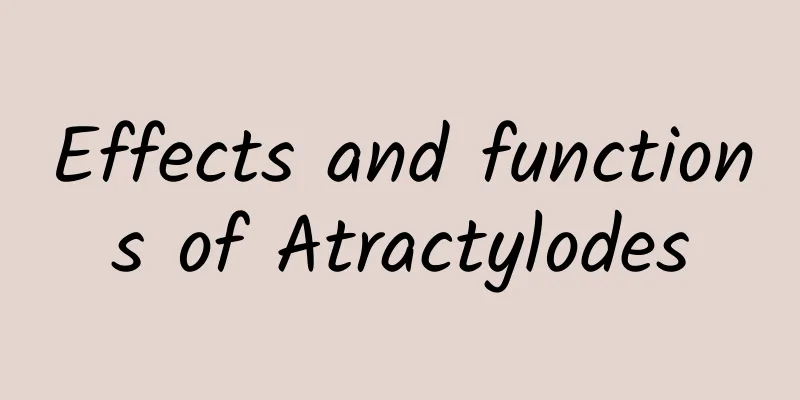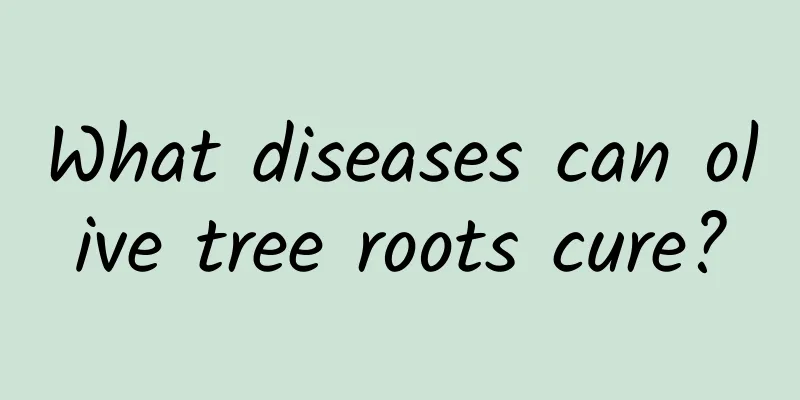The efficacy and function of the traditional Chinese medicine Artemisia annua

|
Artemisia annua is very common in the humid southern region, and Artemisia annua in my country is mainly produced in Chongqing. Artemisia annua has a faint fragrance, irregular leaves, and small flowers in summer. It is often used as a medicine in traditional Chinese medicine. It has high medicinal value. Traditional Chinese medicine believes that it can treat diarrhea, heatstroke and other diseases. It is indeed a very good Chinese herbal medicine. Today I will give you a detailed introduction to the effects and functions of the traditional Chinese medicine Artemisia annua. 1. Artemisia annua has high medicinal value. It can be pulled out in late summer and early autumn, washed and dried for medicinal use. The stems and leaves are used to clear away heat, and the seeds and roots are used to make ointments. Artemisinin comes from the traditional Chinese medicine Artemisia annua, which has a history of 2,000 years. Because it works quickly and has no side effects like other antimalarial drugs, its antimalarial effect is very significant. Furthermore, there are no known cases of artemisinin resistance to date. The combination can further reduce the chance of drug resistance and improve efficacy. Artemisinin derivatives can be used to produce a wide range of medicines. Artemisinin is mainly used to treat malaria, hot flashes caused by tuberculosis, heat stroke, skin itching, urticaria, seborrheic dermatitis and mosquito control. The whole plant is used as medicine, washed and used fresh or dried to make medicine. Artemisia annua crops are easy to grow and manage, have a short growing period, require little investment and yield quick returns. 2. The neutral part of Artemisia annua ether extract and its diluted alcohol extract have significant antimalarial effects against rat malaria, monkey malaria and human malaria. In vivo experiments have shown that artemisinin has a killing effect on the erythrocytic stage of Plasmodium, but is ineffective against the extraerythrocytic stage and preerythrocytic stage. Artemisinin has the effect of rapidly inhibiting the maturation of protozoa. The antimalarial effect of artemether emulsion is better than that of reduced artemisinin sodium succinate aqueous solution and is an ideal dosage form for treating severe malaria. 3. Artemisia annua decoction has a strong antibacterial effect on Staphylococcus epidermidis, Catarrhalis, Bacillus anthracis , and Corynebacterium diphtheriae. It also has a certain inhibitory effect on Staphylococcus aureus, Pseudomonas aeruginosa, Shigella dysenteriae, and Mycobacterium tuberculosis. At a concentration of 0.25%, Artemisia annua volatile oil has an antibacterial effect on all dermatophytes, and at a concentration of 1%, it has a bactericidal effect on all dermatophytes. Artemisinin has anti-influenza virus effects. Sodium artesunate has certain antibacterial effects on Staphylococcus aureus, Shigella flexneri, Escherichia coli, Catarrhalis, and Paratyphoid A and B. Sitosterol and stigmasterol in Artemisia annua also have antiviral effects. |
<<: Boil honeysuckle water for bathing
>>: Chinese herbal formula for treating insomnia
Recommend
The efficacy and function of Tianshui ant grass
Tianshui Yicao is a famous traditional commonly u...
The efficacy and function of mixed mushrooms
In modern life, everyone is very familiar with va...
Will showing IP location leak personal information? This move is very dangerous
【Written at the end】 The current display function...
Why is instant coffee, which is despised by the "hand-grinding party", becoming more and more mellow?
Coffee is a popular beverage all over the world. ...
Dosage of Cuttlebone
Many people have never heard of something like cu...
After Valentine's Day, it's Lantern Festival? Wrong! It's still Valentine's Day!
Mixed Health I don't understand the health tr...
What are the effects and functions of Shuyangquan?
The therapeutic and health-care effects of Shuyan...
Can you eat as much as you want while losing weight? Low-calorie snacks are delicious and won’t make you fat
"Would you like to eat potato chips?" -...
Efficacy and function of Erigeron breviscapus
What are the effects of Erigeron tetrandra? As a ...
The efficacy and function of Deer Herb
Diseases require improvement through medicine. Di...
Can Panax notoginseng powder be taken for a long time?
Do you know about Panax notoginseng powder? Panax...
The efficacy and function of Bauhinia
Speaking of Bauhinia, I believe many friends know...
Adding more oil to stir-fried carrots will help nutrients be better absorbed?
Carrots are a nutritious vegetable. The carotenoi...
What are the benefits of Cynomorium songaricum for women
Cynomorium songaricum is one of the most common t...
The efficacy and consumption of Chuanxiong Tianma tea
Chuanxiong and Gastrodia elata tea is a well-know...









